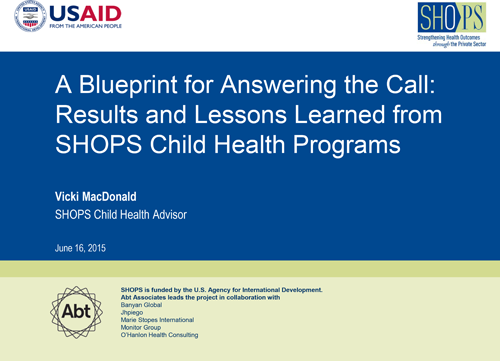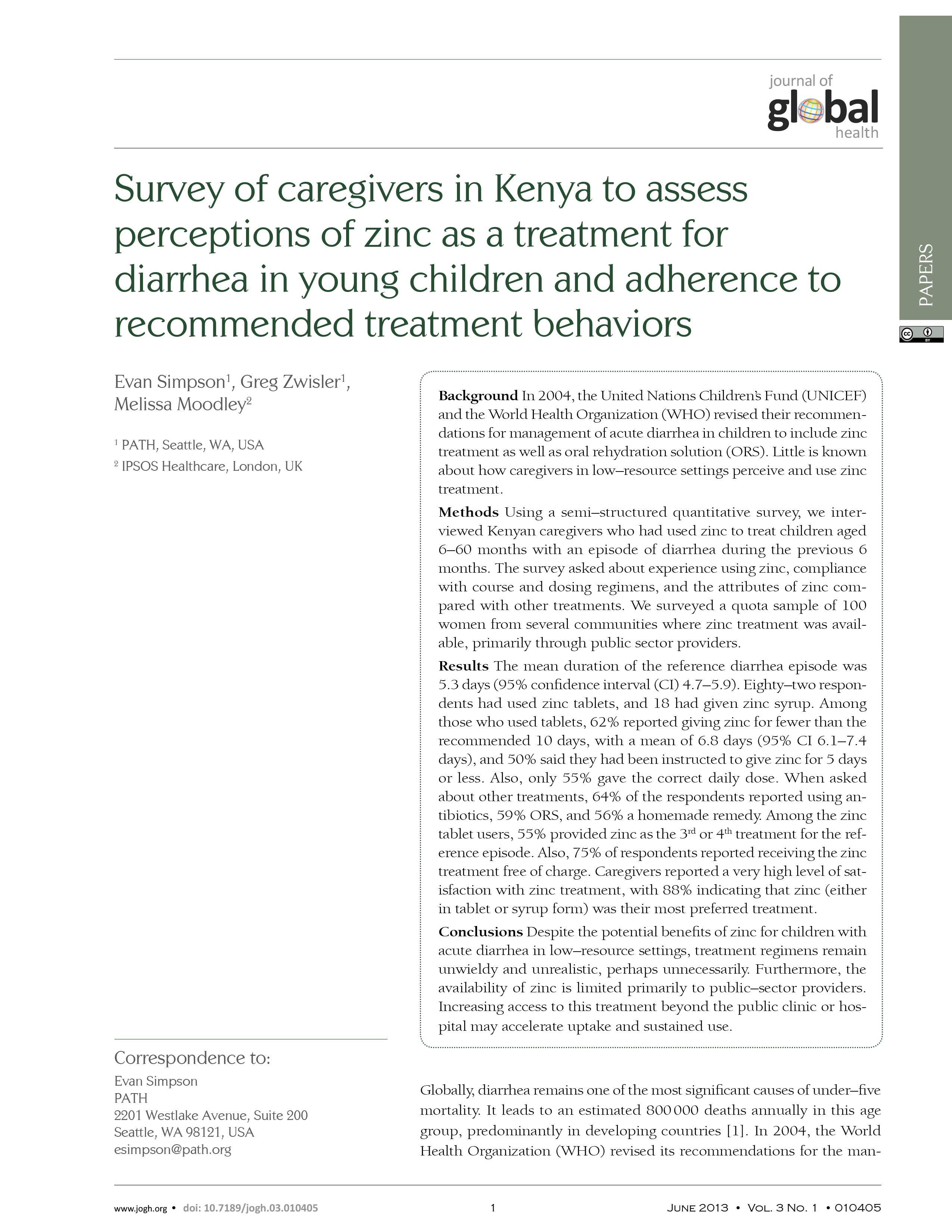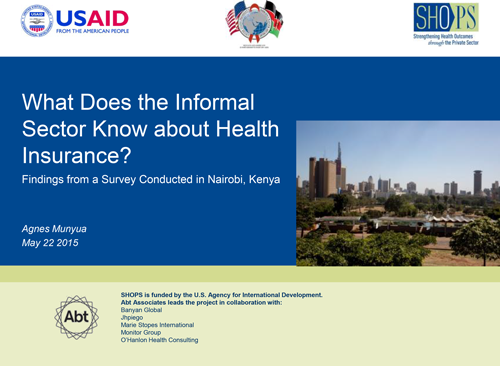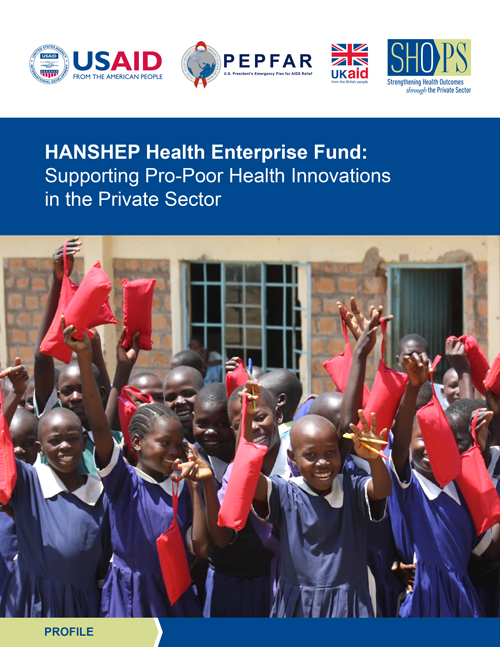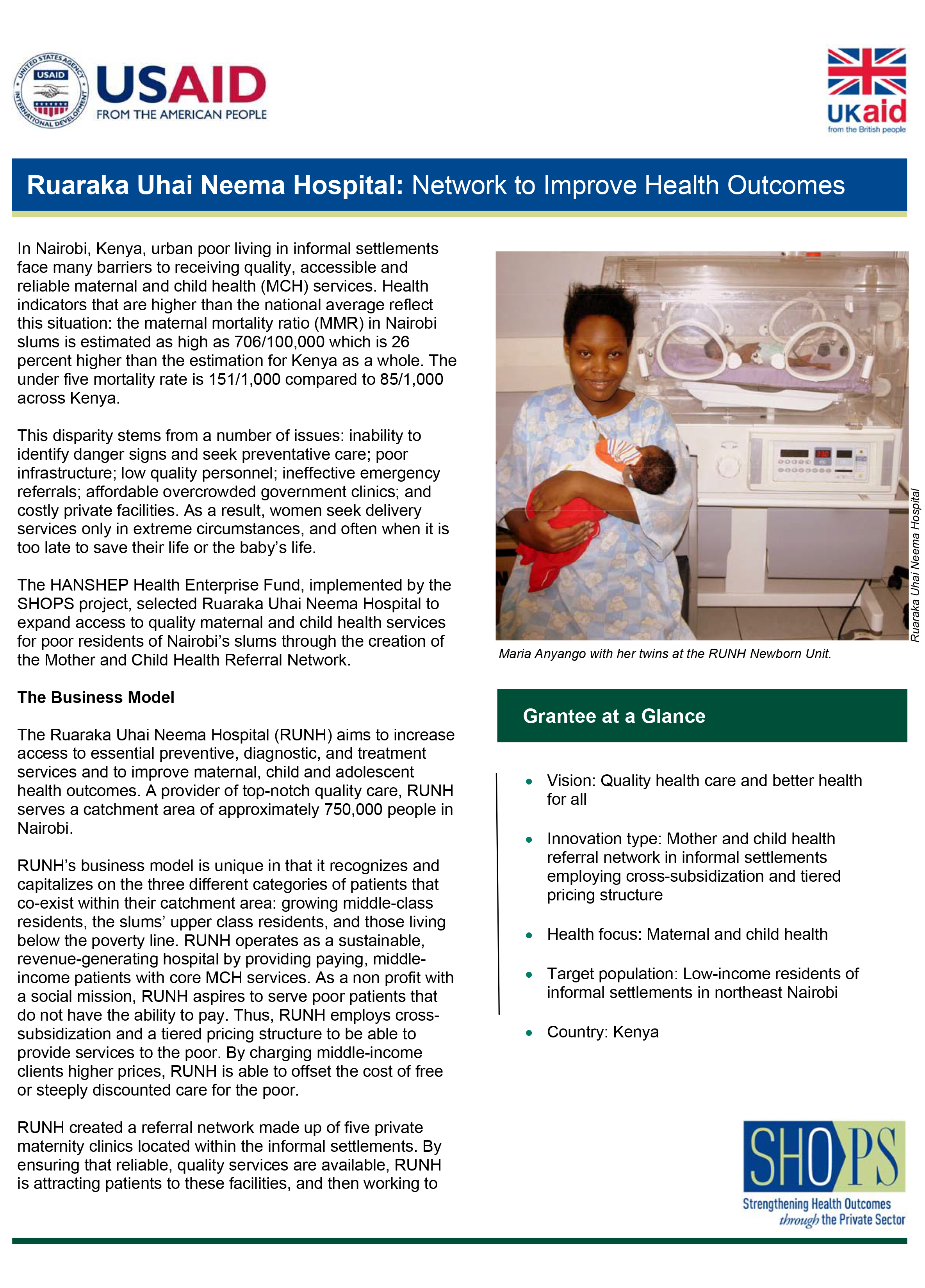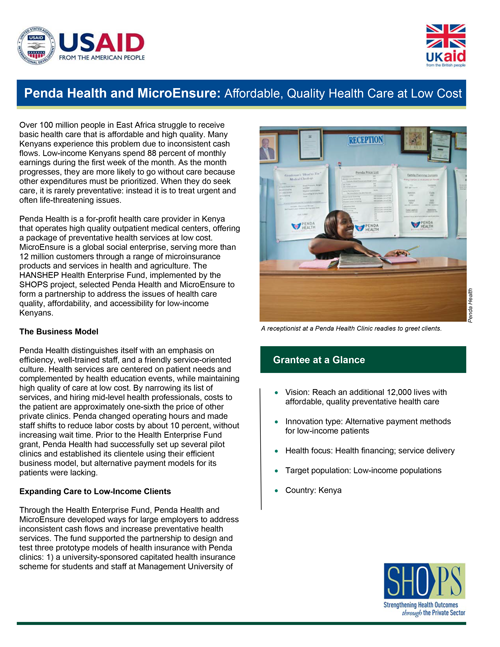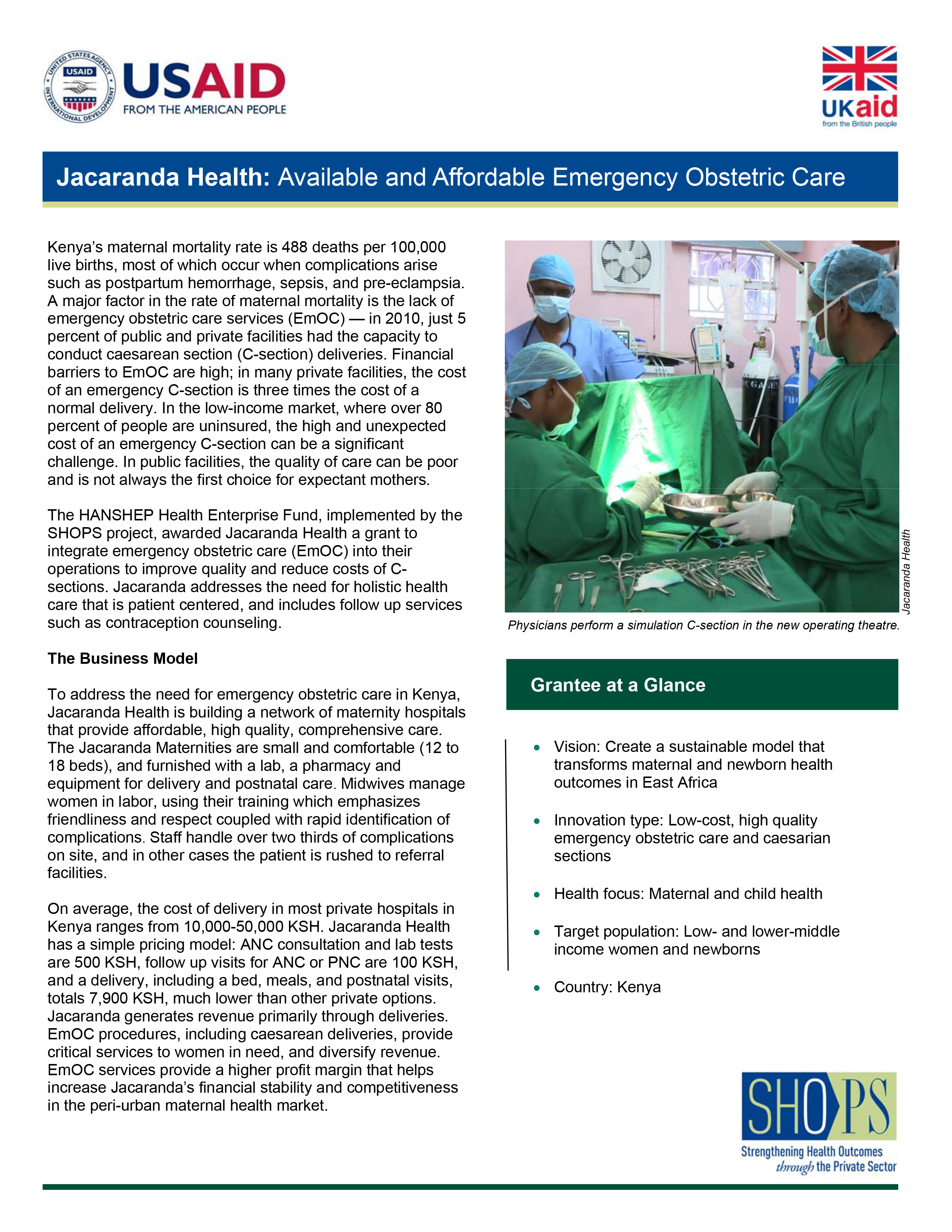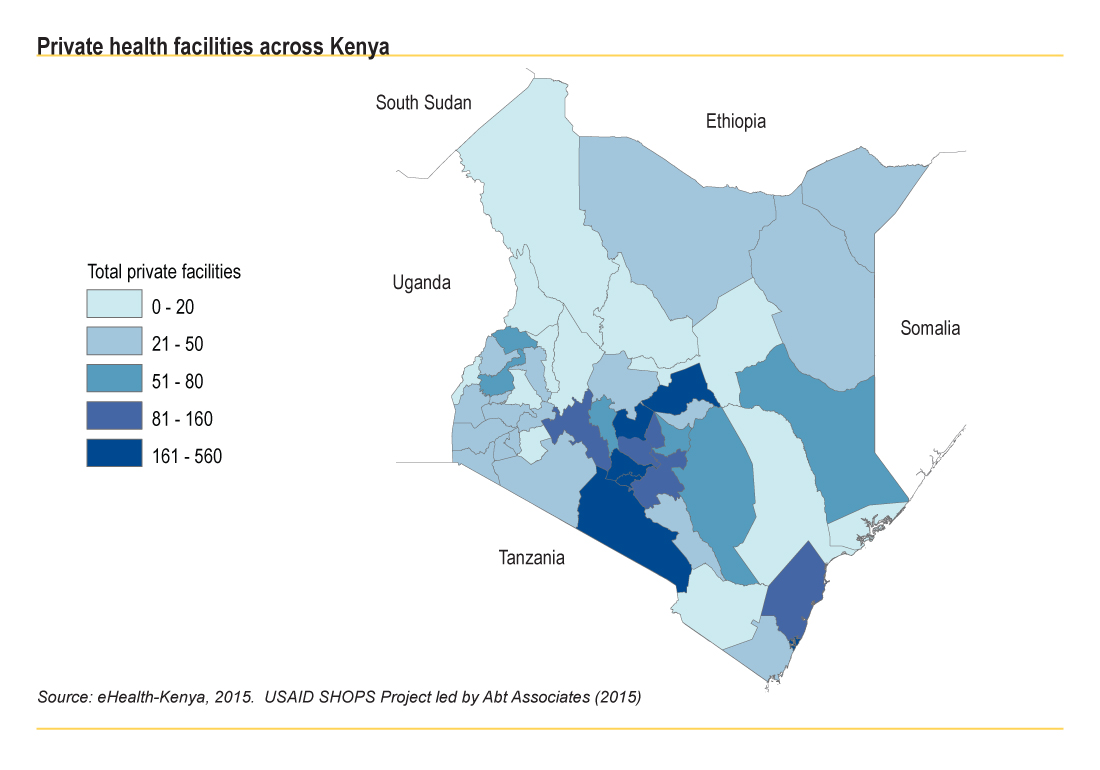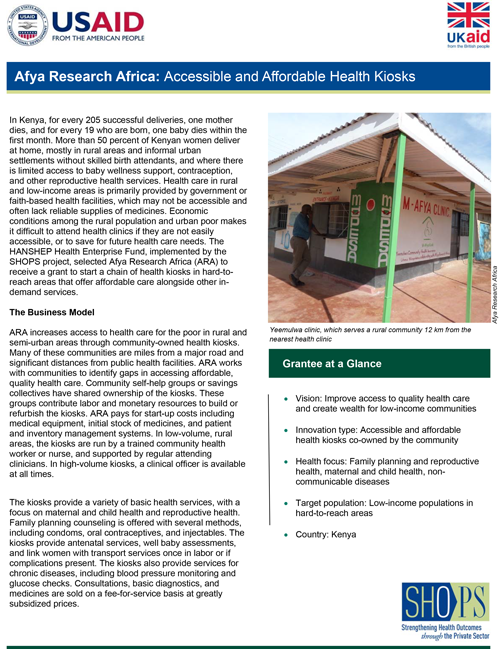
Resource Library
A Blueprint for Answering the Call: Results and Lessons Learned from SHOPS Child Health Programs
This presentation examines results and lessons learned from SHOPS work in child health and diarrhea management. It was presented by Vicki MacDonald at the SHOPS end-of-project event on June 16, 2015.
Resource Type : Presentation
Country : Benin, Ghana, India, Kenya, Madagascar, Nigeria, Uganda
Year : 2015-07-02T00:00:00
Language : English
Project : SHOPS

Resource Library
Survey of Caregivers in Kenya to Assess Perceptions of Zinc as a Treatment for Diarrhea in Young Children and Adherence to Recommended Treatment Behaviors
In 2004, the United Nations Children’s Fund (UNICEF) and the World Health Organization (WHO) revised their recommendations for management of acute diarrhea in children to include zinc treatment as well as oral rehydration solution (ORS). Little is known about how caregivers in low resource settings perceive and use zinc treatment. Using a semi–structured quantitative survey, we interviewed Kenyan caregivers who had used zinc to treat children aged 6–60 months with an episode of diarrhea during the previous 6 months. The survey asked about experience using zinc, compliance with course and dosing regimens, and the attributes of zinc compared with other treatments. We surveyed a quota sample of 100 women from several communities where zinc treatment was available, primarily through public sector providers. The mean duration of the reference diarrhea episode was 5.3 days (95% confidence interval (CI) 4.7–5.9). Eighty–two respondents had used zinc tablets, and 18 had given zinc syrup. Among those who used tablets, 62% reported giving zinc for fewer than the recommended 10 days, with a mean of 6.8 days (95% CI 6.1–7.4 days), and 50% said they had been instructed to give zinc for 5 days or less. Also, only 55% gave the correct daily dose. When asked about other treatments, 64% of the respondents reported using antibiotics, 59% ORS, and 56% a homemade remedy. Among the zinc tablet users, 55% provided zinc as the 3rd or 4th treatment for the reference episode. Also, 75% of respondents reported receiving the zinc treatment free of charge. Caregivers reported a very high level of satisfaction with zinc treatment, with 88% indicating that zinc (either in tablet or syrup form) was their most preferred treatment. Despite the potential benefits of zinc for children with acute diarrhea in low resource settings, treatment regimens remain unwieldy and unrealistic, perhaps unnecessarily. Furthermore, the availability of zinc is limited primarily to public–sector providers. Increasing access to this treatment beyond the public clinic or hospital may accelerate uptake and sustained use.
Resource Type :
Country : Kenya
Year : 2013-06-01T00:00:00
Language : English
Project : SHOPS

Resource Library
What Does the Informal Sector Know about Health Insurance? Findings from a Survey Conducted in Nairobi, Kenya
The presentation examines findings from new research on health care financing knowledge of urban informal workers conducted by the SHOPS project. Agnes Munyua gave the presentation at a Equity Group Foundation workshop on "Reaching the Missing Middle: Improving the Health of Urban Informal Workers in Kenya" on May 22, 2015 in Nairobi.
Resource Type : Presentation
Country : Kenya
Year : 2015-06-17T00:00:00
Language : English
Project : SHOPS

Resource Library
HANSHEP Health Enterprise Fund: Supporting Pro-Poor Health Innovations in the Private Sector
From 2013 to 2015, the Strengthening Health Outcomes through the Private Sector (SHOPS) project implemented the HANSHEP Health Enterprise Fund in Ethiopia, Kenya, and Nigeria. The fund was designed to identify innovative and replicable private sector solutions that address critical health priorities of the poor in sub-Saharan Africa. Through timely investment and targeted technical assistance, the fund supported 16 small businesses to establish proof of concept or to scale their models sufficiently to generate revenue. This profile describes the selection and implementation processes of the fund and highlights several of the grantees’ business models. It also includes the results achieved by the fund and lessons learned to inform future challenge funds.
Resource Type : Report
Country : Ethiopia, Kenya, Nigeria
Year : 2015-05-18T00:00:00
Language : English
Project : SHOPS

Resource Library
Ruaraka Uhai Neema Hospital: Network to Improve Health Outcomes
This profile of Ruaraka Uhai Neema Hospital, a HANSHEP Health Enterprise Fund awardee, provides an overview of the grantee. It includes a description of the challenge Kenyans face in accessing quality maternal health care, the business model Ruaraka is using to address it, the support the Health Enterprise Fund is providing, and the impact of the grantee.
Resource Type :
Country : Kenya
Year : 2015-04-30T00:00:00
Language : English
Project : SHOPS

Resource Library
Penda Health and MicroEnsure: Affordable, Quality Health Care at Low Cost
This profile of Penda Health and MicroEnsure, HANSHEP Health Enterprise Fund awardees, provides an overview of the grantees. It includes a description of the challenge low-income Kenyans face with accessing health care in Kenya, the business model Penda Health and MicroEnsure is using to address it, the support the Health Enterprise Fund is providing, and the impact of the grantee.
Resource Type : Brief
Country : Kenya
Year : 2015-04-30T00:00:00
Language : English
Project : SHOPS

Resource Library
Jacaranda Health: Available and Affordable Emergency Obstetric Care
This profile of Jacaranda Health, a HANSHEP Health Enterprise Fund awardee, provides an overview of the grantee. It includes a description of the challenge Kenyans face win accessing low-cost, high quality emergency obstetric care and caesarian sections, the business model Jacaranda is using to address it, the support the Health Enterprise Fund is providing, and the impact of the grantee.
Resource Type : Brief
Country : Kenya
Year : 2015-04-30T00:00:00
Language : English
Project : SHOPS

Resource Library
Kenya Program Profile
The SHOPS project implemented a three-year program funded by the United States Agency for International Development (February 2012 to September 2015) in Kenya that had two objectives: (1) increase health care coverage through new and expanded private health care financing mechanisms; and (2) increase the availability and improve the sustainability of quality private health and HIV and AIDS services and products by identifying, supporting, and improving private sector models. This profile presents the goals, components, results, and the following lessons learned from the SHOPS program in Kenya:
- The private health sector presents additional opportunities to mobilize domestic resources for health programs.
- Private health insurance could be an effective tool to increase the population of people living with HIV enrolled in antiretroviral therapy by expanding access to care and treatment at private health facilities.
- Engaging the private sector requires addressing business challenges.
- New technologies and data present opportunities to strengthen sustainable private sector models.
- The private sector is not accustomed to sharing information.
Resource Type : Report
Country : Kenya
Year : 2015-04-27T00:00:00
Language : English
Project : SHOPS

Resource Library

Advancing Knowledge to Inform Program Design
Minki Chatterji, research director for the SHOPS project, oversees the project’s research portfolio, which includes global research, process and impact evaluations, formative research, provider censuses, and qualitative behavioral research. A demographer by training, she has more than 10 years of experience in global health research, including work on family planning and reproductive health, HIV and AIDS, and maternal and child health. In this video, Chatterji discusses the range of SHOPS research and how the project incorporates its research into its programs.
Resource Type : Video
Country : Bangladesh, Benin, Bolivia, Botswana, Ethiopia, Ghana, Haiti, India, Jamaica, Jordan, Kenya, Madagascar, Malawi, Mali, Namibia, Nepal, Pakistan, Paraguay, Peru, Philippines, Russia, Sénégal, Senegal, South Africa, Tanzania, UAR, Uganda, Zambia, Zimbabwe
Year : 2015-04-15T12:00:00
Language : English
Project : SHOPS

Resource Library
Afya Research Africa: Accessible and Affordable Health Kiosks
This profile of Afya Research Africa, a HANSHEP Health Enterprise Fund awardee, provides an overview of the grantee. It includes a description of the challenge posed by health care in rural and low-income areas in Kenya, the business model Afya Research Africa is using to address it, the support the Health Enterprise Fund is providing, and the impact of the grantee.
Resource Type :
Country : Kenya
Year : 2015-03-25T00:00:00
Language : English
Project : SHOPS
Pagination
- Previous page
- Page 6
- Next page


